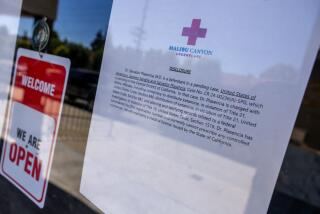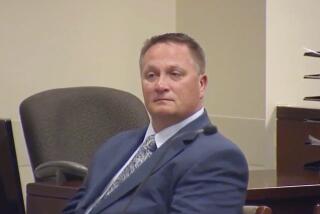Paramedic Dubbed ‘Dr. Death’ Sent to Jail
- Share via
Former Los Angeles paramedic Robert Dougherty was sentenced Friday to a year in jail for refusing to treat a dying alcoholic, a man he described later as a “scumbag” who needed social services help, not a rescue ambulance.
Dougherty, 49, who had pleaded guilty to a felony count of falsifying a medical report after the patient died, also was fined $1,000 and ordered to return to court in six months to determine whether the jail term should be commuted to community service in a detoxification center for alcoholics or an AIDS hospice.
“He failed as a paramedic, as a fireman and as a human being to do his job,” Superior Court Judge J. D. Smith said of the Sept. 23, 1985, incident in which Dougherty was called twice to the bedside of Melvin Wagner at a Skid Row hotel in Wilmington but ignored a social worker’s pleas to take Wagner to the hospital or even to take the man’s vital signs.
Wagner died about 5 1/2 hours after Dougherty and his partner were first called to the hotel and about half an hour after the paramedics’ second visit, during which they did not even go into Wagner’s room.
After a third visit to the hotel, Dougherty pronounced Wagner dead and ordered his partner to make up phony vital signs to make it appear as though the team had examined him during earlier visits, the 20-year Los Angeles Fire Department veteran admitted in pleading guilty in July.
An autopsy later determined that Wagner had died of complications of cirrhosis of the liver. Pathologists could not determine conclusively whether he would have lived substantially longer had Dougherty taken him to the hospital when he was first called to the scene.
In sentencing documents filed with the court, prosecutors revealed that Dougherty, nicknamed “Dr. Death” by his colleagues at the Fire Department, had been the subject of more complaints from citizens, nurses and doctors than any other paramedic on the force, often for being “rude and abusive” to patients but occasionally for declining to treat seriously ill patients.
In one case, according to the documents, Dougherty dismissed a patient with a gunshot wound to the head who could not speak because of his injury as a “mute” with a surface wound. The true injury was discovered only after police officers took the man to the hospital after Dougherty had left, according to Deputy Dist. Atty. Brian R. Kelberg, who prosecuted the case.
In another case, Dougherty refused to examine or hospitalize an accident victim whose head had gone through a car windshield. The woman did not know what year it was or where she was, and Dougherty stated that she was “drunk” and ordered his partner back into the ambulance, according to the documents.
“The defendant played ‘Russian roulette’ with patient lives,” Kelberg wrote in a memorandum to the court. “Melvin Wagner was simply the terminal episode in a continuing course of conduct which inevitably could only lead to a patient’s death. It was never a question of whether a patient would die from the defendant’s arbitrary practices; rather, it was merely a question of where and when.”
The prosecution, the judge and the probation examiner were all critical of the Fire Department’s failure to deal more strongly with the frequent complaints about Dougherty, who received more than twice the number of verified complaints of any other paramedic on the force and who had been reprimanded on two occasions for improper medical treatment.
“We can only wonder why the defendant was allowed to maintain his employment as a paramedic in view of the overwhelming evidence regarding his lack of competence, sensitivity and even professional ethics,” the Probation Department said in its report to the court.
“Even if only a portion of the unfavorable material were true, it would appear that more severe disciplinary measures would have been appropriate, up to and including discharge.”
Judge Smith said he was “not going to indict the Fire Department, because they’re like brothers to us,” but he questioned the department’s consistent defense against criticism in the case. “It’s like they don’t want to find anything negative here,” he said. “Well, there’s something negative here.”
A number of emergency room doctors and nurses and fellow Fire Department officials wrote letters on Dougherty’s behalf, praising his commitment to emergency medicine and his past exemplary efforts in saving patients’ lives.
Dougherty himself expressed his “regret” over Wagner’s death in a written statement to the court. “I regret the death of many patients over the years,” he said, “but yet it has been established by medical examination that Mr. Wagner was dying by his own life style.”
Dougherty “in all likelihood had on occasion poor ‘bedside manners,’ ” his attorney, Philip Daigneault, told the court in a sentencing memorandum.
“It is urged, however, that he has never done anything to intentionally harm or jeopardize a patient, and if he was negligent on occasion, it certainly cannot rationally be argued that it was with the intent to harm anyone or for any personal gain.”
The Probation Department also raised the possibility that Dougherty’s long hours on the job--he was reportedly on his third 24-hour shift without a break when called to Wagner’s hotel--may have contributed to the incident.
“It would not be inappropriate to conclude, as many of the defendant’s references have, that Bob Dougherty was a paramedic who answered too many calls, worked too many hours and saw too much suffering and death,” wrote probation investigator James A. McAfee.
More to Read
Sign up for Essential California
The most important California stories and recommendations in your inbox every morning.
You may occasionally receive promotional content from the Los Angeles Times.













